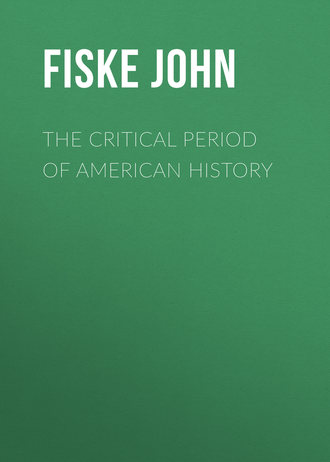 полная версия
полная версияThe Critical Period of American History
CHAPTER II.
THE THIRTEEN COMMONWEALTHS
Departure of the British troops, Nov. 25, 1783.
Washington resigns his command, Dec. 23.
"The times that tried men's souls are over," said Thomas Paine in the last number of the "Crisis," which he published after hearing that the negotiations for a treaty of peace had been concluded. The preliminary articles had been signed at Paris on the 20th of January, 1783. The news arrived in America on the 23d of March, in a letter to the president of Congress from Lafayette, who had returned to France soon after the victory at Yorktown. A few days later Sir Guy Carleton received his orders from the ministry to proclaim a cessation of hostilities by land and sea. A similar proclamation made by Congress was formally communicated to the army by Washington on the 19th of April, the eighth anniversary of the first bloodshed on Lexington green. Since Wayne had driven the British from Georgia, early in the preceding year, there had been no military operations between the regular armies. Guerrilla warfare between Whig and Tory had been kept up in parts of South Carolina and on the frontier of New York, where Thayendanegea was still alert and defiant; while beyond the mountains the tomahawk and scalping-knife had been busy, and Washington's old friend and comrade, Colonel Crawford, had been scorched to death by the firebrands of the red demons; but the armies had sat still, awaiting the peace which every one felt sure must speedily come. After Cornwallis's surrender, Washington marched his army back to the Hudson, and established his headquarters at Newburgh. Rochambeau followed somewhat later, and in September joined the Americans on the Hudson; but in December the French army marched to Boston, and there embarked for France. After the formal cessation of hostilities on the 19th of April, 1783, Washington granted furloughs to most of his soldiers; and these weather-beaten veterans trudged homeward in all directions, in little groups of four or five, depending largely for their subsistence on the hospitality of the farm-houses along the road. Arrived at home, their muskets were hung over the chimney-piece as trophies for grandchildren to be proud of, the stories of their exploits and their sufferings became household legends, and they turned the furrows and drove the cattle to pasture just as in the "old colony times." Their furloughs were equivalent to a full discharge, for on the 3d of September the definitive treaty was signed, and the country was at peace. On the 3d of November the army was formally disbanded, and on the 25th of that month Sir Guy Carleton's army embarked from New York. Small British garrisons still remained in the frontier posts of Ogdensburg, Oswego, Niagara, Erie, Sandusky, Detroit, and Mackinaw, but by the terms of the treaty these places were to be promptly surrendered to the United States. On the 4th of December a barge waited at the South Ferry in New York to carry General Washington across the river to Paulus Hook. He was going to Annapolis, where Congress was in session, in order to resign his command. At Fraunces's Tavern, near the ferry, he took leave of the officers who so long had shared his labours. One after another they embraced their beloved commander, while there were few dry eyes in the company. They followed him to the ferry, and watched the departing boat with hearts too full for words, and then in solemn silence returned up the street. At Philadelphia he handed to the comptroller of the treasury a neatly written manuscript, containing an accurate statement of his expenses in the public service since the day when he took command of the army. The sums which Washington had thus spent out of his private fortune amounted to $64,315. For his personal services he declined to take any pay. At noon of the 23d, in the presence of Congress and of a throng of ladies and gentlemen at Annapolis, the great general gave up his command, and requested as an "indulgence" to be allowed to retire into private life. General Mifflin, who during the winter of Valley Forge had conspired with Gates to undermine the confidence of the people in Washington, was now president of Congress, and it was for him to make the reply. "You retire," said Mifflin, "from the theatre of action with the blessings of your fellow-citizens, but the glory of your virtues will not terminate with your military command; it will continue to animate remotest ages." The next morning Washington hurried away to spend Christmas at his pleasant home at Mount Vernon, which, save for a few hours in the autumn of 1781, he had not set eyes on for more than eight years. His estate had suffered from his long absence, and his highest ambition was to devote himself to its simple interests. To his friends he offered unpretentious hospitality. "My manner of living is plain," he said, "and I do not mean to be put out of it. A glass of wine and a bit of mutton are always ready, and such as will be content to partake of them are always welcome. Those who expect more will be disappointed." To Lafayette he wrote that he was now about to solace himself with those tranquil enjoyments of which the anxious soldier and the weary statesman know but little. "I have not only retired from all public employments, but I am retiring within myself, and shall be able to view the solitary walk and tread the paths of private life with heartfelt satisfaction. Envious of none, I am determined to be pleased with all; and this, my dear friend, being the order of my march, I will move gently down the stream of life until I sleep with my fathers."
His "legacy" to the American people, June 8, 1783.
In these hopes Washington was to be disappointed. "All the world is touched by his republican virtues," wrote Luzerne to Vergennes, "but it will be useless for him to try to hide himself and live the life of a private man: he will always be the first citizen of the United States." It indeed required no prophet to foretell that the American people could not long dispense with the services of this greatest of citizens. Washington had already put himself most explicitly on record as the leader of the men who were urging the people of the United States toward the formation of a more perfect union. The great lesson of the war had not been lost on him. Bitter experience of the evils attendant upon the weak government of the Continental Congress had impressed upon his mind the urgent necessity of an immediate and thorough reform. On the 8th of June, in view of the approaching disbandment of the army, he had addressed to the governors and presidents of the several states a circular letter, which he wished to have regarded as his legacy to the American people. In this letter he insisted upon four things as essential to the very existence of the United States as an independent power. First, there must be an indissoluble union of all the states under a single federal government, which must possess the power of enforcing its decrees; for without such authority it would be a government only in name. Secondly, the debts incurred by Congress for the purpose of carrying on the war and securing independence must be paid to the uttermost farthing. Thirdly, the militia system must be organized throughout the thirteen states on uniform principles. Fourthly, the people must be willing to sacrifice, if need be, some of their local interests to the common weal; they must discard their local prejudices, and regard one another as fellow-citizens of a common country, with interests in the deepest and truest sense identical.
Absence of a sentiment of union, and consequent danger of anarchy.
The unparalleled grandeur of Washington's character, his heroic services, and his utter disinterestedness had given him such a hold upon the people as scarcely any other statesman known to history, save perhaps William the Silent, has ever possessed. The noble and sensible words of his circular letter were treasured up in the minds of all the best people in the country, and when the time for reforming the weak and disorderly government had come it was again to Washington that men looked as their leader and guide. But that time had not yet come. Only through the discipline of perplexity and tribulation could the people be brought to realize the indispensable necessity of that indissoluble union of which Washington had spoken. Thomas Paine was sadly mistaken when, in the moment of exultation over the peace, he declared that the trying time was ended. The most trying time of all was just beginning. It is not too much to say that the period of five years following the peace of 1783 was the most critical moment in all the history of the American people. The dangers from which we were saved in 1788 were even greater than the dangers from which we were saved in 1865. In the War of Secession the love of union had come to be so strong that thousands of men gave up their lives for it as cheerfully and triumphantly as the martyrs of older times, who sang their hymns of praise even while their flesh was withering in the relentless flames. In 1783 the love of union, as a sentiment for which men would fight, had scarcely come into existence among the people of these states. The souls of the men of that day had not been thrilled by the immortal eloquence of Webster, nor had they gained the historic experience which gave to Webster's words their meaning and their charm. They had not gained control of all the fairest part of the continent, with domains stretching more than three thousand miles from ocean to ocean, and so situated in geographical configuration and commercial relations as to make the very idea of disunion absurd, save for men in whose minds fanaticism for the moment usurped the place of sound judgment. The men of 1783 dwelt in a long, straggling series of republics, fringing the Atlantic coast, bordered on the north and south and west by two European powers whose hostility they had some reason to dread. But nine years had elapsed since, in the first Continental Congress, they had begun to act consistently and independently in common, under the severe pressure of a common fear and an immediate necessity of action. Even under such circumstances the war had languished and come nigh to failure simply through the difficulty of insuring concerted action. Had there been such a government that the whole power of the thirteen states could have been swiftly and vigorously wielded as a unit, the British, fighting at such disadvantage as they did, might have been driven to their ships in less than a year. The length of the war and its worst hardships had been chiefly due to want of organization. Congress had steadily declined in power and in respectability; it was much weaker at the end of the war than at the beginning; and there was reason to fear that as soon as the common pressure was removed the need for concerted action would quite cease to be felt, and the scarcely formed Union would break into pieces. There was the greater reason for such a fear in that, while no strong sentiment had as yet grown up in favour of union, there was an intensely powerful sentiment in favour of local self-government. This feeling was scarcely less strong as between states like Connecticut and Rhode Island, or Maryland and Virginia, than it was between Athens and Megara, Argos and Sparta, in the great days of Grecian history. A most wholesome feeling it was, and one which needed not so much to be curbed as to be guided in the right direction. It was a feeling which was shared by some of the foremost Revolutionary leaders, such as Samuel Adams and Richard Henry Lee. But unless the most profound and delicate statesmanship should be forthcoming, to take this sentiment under its guidance, there was much reason to fear that the release from the common adhesion to Great Britain would end in setting up thirteen little republics, ripe for endless squabbling, like the republics of ancient Greece and mediæval Italy, and ready to become the prey of England and Spain, even as Greece became the prey of Macedonia.
False historic analogies.
As such a lamentable result was dreaded by Washington, so by statesmen in Europe it was generally expected, and by our enemies it was eagerly hoped for. Josiah Tucker, Dean of Gloucester, was a far-sighted man in many things; but he said, "As to the future grandeur of America, and its being a rising empire under one head, whether republican or monarchical, it is one of the idlest and most visionary notions that ever was conceived even by writers of romance. The mutual antipathies and clashing interests of the Americans, their difference of governments, habitudes, and manners, indicate that they will have no centre of union and no common interest. They never can be united into one compact empire under any species of government whatever; a disunited people till the end of time, suspicious and distrustful of each other, they will be divided and subdivided into little commonwealths or principalities, according to natural boundaries, by great bays of the sea, and by vast rivers, lakes, and ridges of mountains." Such were the views of a liberal-minded philosopher who bore us no ill-will. George III. said officially that he hoped the Americans would not suffer from the evils which in history had always followed the throwing off of monarchical government: which meant, of course, that he hoped they would suffer from such evils. He believed we should get into such a snarl that the several states, one after another, would repent and beg on their knees to be taken back into the British empire. Frederick of Prussia, though friendly to the Americans, argued that the mere extent of country from Maine to Georgia would suffice either to break up the Union, or to make a monarchy necessary. No republic, he said, had ever long existed on so great a scale. The Roman republic had been transformed into a despotism mainly by the excessive enlargement of its area. It was only little states, like Venice, Switzerland, and Holland, that could maintain a republican government. Such arguments were common enough a century ago, but they overlooked three essential differences between the Roman republic and the United States. The Roman republic in Cæsar's time comprised peoples differing widely in blood, in speech, and in degree of civilization; it was perpetually threatened on all its frontiers by powerful enemies; and representative assemblies were unknown to it. The only free government of which the Roman knew anything was that of the primary assembly or town meeting. On the other hand, the people of the United States were all English in speech, and mainly English in blood. The differences in degree of civilization between such states as Massachusetts and North Carolina were considerable, but in comparison with such differences as those between Attika and Lusitania they might well be called slight. The attacks of savages on the frontier were cruel and annoying, but never since the time of King Philip had they seemed to threaten the existence of the white man. A very small military establishment was quite enough to deal with the Indians. And to crown all, the American people were thoroughly familiar with the principle of representation, having practised it on a grand scale for four centuries in England, and for more than a century in America. The governments of the thirteen states were all similar, and the political ideas of one were perfectly intelligible to all the others. It was essentially fallacious, therefore, to liken the case of the United States to that of ancient Rome.
Influence of railroad and telegraph upon perpetuity of the American Union.
But there was another feature of the case which was quite hidden from the men of 1783. Just before the assembling of the first Continental Congress James Watt had completed his steam-engine; in the summer of 1787, while the Federal Convention was sitting at Philadelphia, John Fitch launched his first steamboat on the Delaware River; and Stephenson's invention of the locomotive was to follow in less than half a century. Even with all other conditions favourable, it is doubtful if the American Union could have been preserved to the present time without the railroad. But for the military aid of railroads our government would hardly have succeeded in putting down the rebellion of the southern states. In the debates on the Oregon Bill in the United States Senate in 1843, the idea that we could ever have an interest in so remote a country as Oregon was loudly ridiculed by some of the members. It would take ten months – said George McDuffie, the very able senator from South Carolina – for representatives to get from that territory to the District of Columbia and back again. Yet since the building of railroads to the Pacific coast, we can go from Boston to the capital of Oregon in much less time than it took John Hancock to make the journey from Boston to Philadelphia. Railroads and telegraphs have made our vast country, both for political and for social purposes, more snug and compact than little Switzerland was in the Middle Ages or New England a century ago.
Difficulty of travelling a hundred years ago.
At the time of our Revolution the difficulties of travelling formed an important social obstacle to the union of the states. In our time the persons who pass in a single day between New York and Boston by six or seven distinct lines of railroad and steamboat are numbered by thousands. In 1783 two stage-coaches were enough for all the travellers, and nearly all the freight besides, that went between these two cities, except such large freight as went by sea around Cape Cod. The journey began at three o'clock in the morning. Horses were changed every twenty miles, and if the roads were in good condition some forty miles would be made by ten o'clock in the evening. In bad weather, when the passengers had to get down and lift the clumsy wheels out of deep ruts, the progress was much slower. The loss of life from accidents, in proportion to the number of travellers, was much greater than it has ever been on the railway. Broad rivers like the Connecticut and Housatonic had no bridges. To drive across them in winter, when they were solidly frozen over, was easy; and in pleasant summer weather to cross in a row-boat was not a dangerous undertaking. But squalls at some seasons and floating ice at others were things to be feared. More than one instance is recorded where boats were crushed and passengers drowned, or saved only by scrambling upon ice-floes. After a week or ten days of discomfort and danger the jolted and jaded traveller reached New York. Such was a journey in the most highly civilized part of the United States. The case was still worse in the South, and it was not so very much better in England and France. In one respect the traveller in the United States fared better than the traveller in Europe: the danger from highwaymen was but slight.
Local jealousies and antipathies, an inheritance from primeval savagery.
Such being the difficulty of travelling, people never made long journeys save for very important reasons. Except in the case of the soldiers, most people lived and died without ever having seen any state but their own. And as the mails were irregular and uncertain, and the rates of postage very high, people heard from one another but seldom. Commercial dealings between the different states were inconsiderable. The occupation of the people was chiefly agriculture. Cities were few and small, and each little district for the most part supported itself. Under such circumstances the different parts of the country knew very little about each other, and local prejudices were intense. It was not simply free Massachusetts and slave-holding South Carolina, or English Connecticut and Dutch New York, that misunderstood and ridiculed each the other; but even between such neighbouring states as Connecticut and Massachusetts, both of them thoroughly English and Puritan, and in all their social conditions almost exactly alike, it used often to be said that there was no love lost. These unspeakably stupid and contemptible local antipathies are inherited by civilized men from that far-off time when the clan system prevailed over the face of the earth, and the hand of every clan was raised against its neighbours. They are pale and evanescent survivals from the universal primitive warfare, and the sooner they die out from human society the better for every one. They should be stigmatized and frowned down upon every fit occasion, just as we frown upon swearing as a symbol of anger and contention. But the only thing which can finally destroy them is the widespread and unrestrained intercourse of different groups of people in peaceful social and commercial relations. The rapidity with which this process is now going on is the most encouraging of all the symptoms of our modern civilization. But a century ago the progress made in this direction had been relatively small, and it was a very critical moment for the American people.
Conservative character of the Revolution.
The thirteen states, as already observed, had worked in concert for only nine years, during which their coöperation had been feeble and halting. But the several state governments had been in operation since the first settlement of the country, and were regarded with intense loyalty by the people of the states. Under the royal governors the local political life of each state had been vigorous and often stormy, as befitted communities of the sturdy descendants of English freemen. The legislative assembly of each state had stoutly defended its liberties against the encroachments of the governor. In the eyes of the people it was the only power on earth competent to lay taxes upon them, it was as supreme in its own sphere as the British Parliament itself, and in behalf of this rooted conviction the people had gone to war and won their independence from England. During the war the people of all the states, except Connecticut and Rhode Island, had carefully remodelled their governments, and in the performance of this work had withdrawn many of their ablest statesmen from the Continental Congress; but except for the expulsion of the royal and proprietary governors, the work had in no instance been revolutionary in its character. It was not so much that the American people gained an increase of freedom by their separation from England, as that they kept the freedom they had always enjoyed, that freedom which was the inalienable birthright of Englishmen, but which George III. had foolishly sought to impair. The American Revolution was therefore in no respect destructive. It was the most conservative revolution known to history, thoroughly English in conception from beginning to end. It had no likeness whatever to the terrible popular convulsion which soon after took place in France. The mischievous doctrines of Rousseau had found few readers and fewer admirers among the Americans. The principles upon which their revolution was conducted were those of Sidney, Harrington, and Locke. In remodelling the state governments, as in planning the union of the states, the precedents followed and the principles applied were almost purely English. We must now pass in review the principal changes wrought in the several states, and we shall then be ready to consider the general structure of the Confederation, and to describe the remarkable series of events which led to the adoption of our Federal Constitution.
State governments remodelled; assemblies continued from colonial times.
It will be remembered that at the time of the Declaration of Independence there were three kinds of government in the colonies. Connecticut and Rhode Island had always been true republics, with governors and legislative assemblies elected by the people. Pennsylvania, Delaware, and Maryland presented the appearance of limited hereditary monarchies. Their assemblies were chosen by the people, but the lords proprietary appointed their governors, or in some instances acted as governors themselves. In Maryland the office of lord proprietary was hereditary in the Calvert family; in Delaware and Pennsylvania, which, though distinct commonwealths with separate legislatures, had the same executive head, it was hereditary in the Penn family. The other eight colonies were viceroyalties, with governors appointed by the king, while in all alike the people elected the legislatures. Accordingly in Connecticut and Rhode Island no change was made necessary by the Revolution, beyond the mere omission of the king's name from legal documents; and their charters, which dated from the middle of the seventeenth century, continued to do duty as state constitutions till far into the nineteenth. During the Revolutionary War all the other states framed new constitutions, but in most essential respects they took the old colonial charters for their model. The popular legislative body remained unchanged even in its name. In North Carolina its supreme dignity was vindicated in its title of the House of Commons; in Virginia it was called the House of Burgesses; in most of the states the House of Representatives. The members were chosen each year, except in South Carolina, where they served for two years. In the New England states they represented the townships, in other states the counties. In all the states except Pennsylvania a property qualification was required of them.







